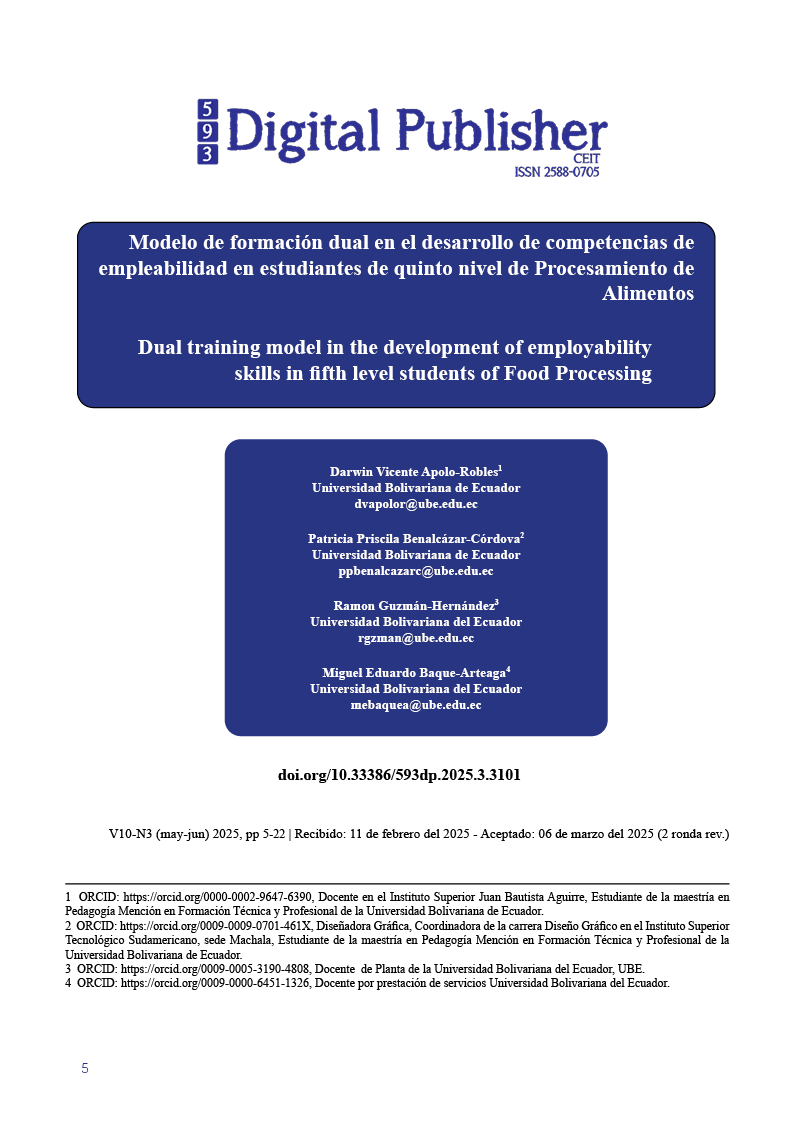Dual training model in the development of employability skills in fifth level students of Food Processing
Main Article Content
Abstract
The dual training model in the Food Processing career addresses the disconnect between technical education and labor market demands. This system combines academic theory with business practice to develop essential technical skills and soft skills. The research assessed the model's impact on students, graduates, and tutors. Results show that 68% of graduates work in the sector, highlighting competencies in teamwork, time management, and effective communication. However, areas for improvement in leadership and innovation were identified. It is concluded that the model significantly increases employability, with over 53% of graduates finding employment within three months. Although effective, it is recommended to strengthen collaboration between institutions and companies, update curricular content, and ensure equity in practical experiences regardless of company size. Thus, the model not only prepares students to face challenges in the food sector but also contributes to sustainable professional development and sector competitiveness.
Downloads
Article Details

This work is licensed under a Creative Commons Attribution-NonCommercial-ShareAlike 4.0 International License.
1. Derechos de autor
Las obras que se publican en 593 Digital Publisher CEIT están sujetas a los siguientes términos:
1.1. 593 Digital Publisher CEIT, conserva los derechos patrimoniales (copyright) de las obras publicadas, favorece y permite la reutilización de las mismas bajo la licencia Licencia Creative Commons 4.0 de Reconocimiento-NoComercial-CompartirIgual 4.0, por lo cual se pueden copiar, usar, difundir, transmitir y exponer públicamente, siempre que:
1.1.a. Se cite la autoría y fuente original de su publicación (revista, editorial, URL).
1.1.b. No se usen para fines comerciales u onerosos.
1.1.c. Se mencione la existencia y especificaciones de esta licencia de uso.
References
Boonsri, S., Pupat, P., & Suwanjan, P. (2019). "Dual Vocational Students’ Competency: A Second Order Confirmatory Factor Analysis of Occupational Competency in Enterprise".
Busemeyer, M. R., & Trampusch, C. (2012). "The Political Economy of Collective Skill Formation". Google Books.
Cedefop. (2012). "Work-Based Learning in Europe". Informe. Disponible en Cedefop.
Deissinger, T. (2015). "The German Dual System". Capítulo de libro. Taylor & Francis Online.
Eichhorst, W., & Neder, F. (2014). "Dual Training in Germany". IZA World of Labor.
Fuller, A., & Unwin, L. (2011). "Work and Learning: The Impact on Young Workers". Routledge.
Komariah, K. (2015). "The Role of Work-Based Learning in Building Employability Skills of Vocational Education Students". ICTVET Proceedings.
Lee, H., & Kim, Y. (2021). "Competency-Based Assessment in Dual Vocational Education".
Opushko, A. (2023). "Challenges in Dual Education: A Comparative Study".
Rauner, F., & Wittig, W. (2010). "Innovations in Vocational Education and Training". Springer.
Raffe, D. (2014). "The Role of Assessment in Work-Based Learning". Wiley Online Library.
Smith, E. (2019). "Work-based Learning in Food Industry Education". ResearchGate.
Subekti, S., Ana, A., & Muktiarni, M. (2019). "Developing Employability Skills Using the Work-Based Learning Model". TECH.
Yorke, M. (2006). "Employability in Higher Education: What It Is – What It Is Not". Amazon.





